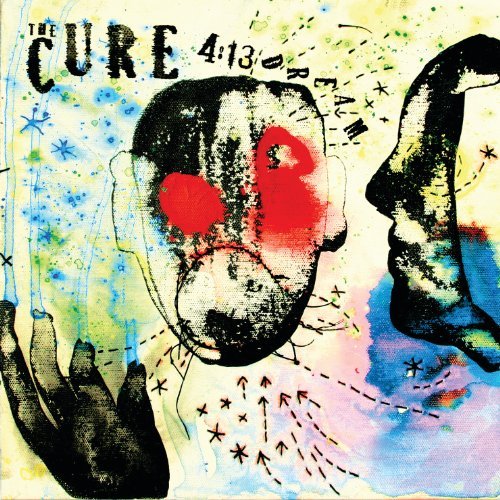
The Cure
4:13 Dream
Release Date: Oct 28, 2008
Genre(s): Rock, Alternative
Record label: Geffen
Music Critic Score
How the Music Critic Score works
Buy 4:13 Dream from Amazon
Album Review: 4:13 Dream by The Cure
Fairly Good, Based on 9 Critics
Based on rating 4/5
"The two of us is all there is," sings Cure prime mover Robert Smith on the breezy escapist pop of The Perfect Boy. "The rest is all a dream." Always a sucker for a love song about shutting out the big, bad world, Smith makes his music in a similar state of splendid isolation, a stranger to fashion. After 30-odd years, the question is not whether the Cure will spring any major surprises - they won't - but whether they can steer clear of the self-parodic shtick that mired their 1990s albums.
Based on rating 4.0/5
Review Summary: Classic Cure this is not, but 4:13 Dream is certainly easier to digest than some of the band's previous works.Four years, a cancelled North American tour, and a slew of missed deadlines later, The Cure has finally released their thirteenth studio album. It's been a long, arduous process for the band's fans (and probably the band itself), a fact a good friend of mine hasn't been reluctant to remind me of. “[But] still," he would tell me, "at least their next album is supposed to be a double album!" That was eleven months ago.
Based on rating 6.9/10
Old Dog, Old TricksLike much of Robert Smith’s work over the past decade, 4:13 Dream is an ambitious mess. The sound is big and unruly: backward tape effects, strangulated psychedelic guitars, Smith wallowing, freaking out, repeating, “You’ve got what I want” with the sublime petulance of a disenchanted old Goth. He isn’t mellowing with age, but serving up more Cure, as you’ve come to expect.
Based on rating 3/5
For a band who haven't made a great record in years and who, visually, are anchored in an era when crimpers were part of every black-clad boy's wardrobe, the Cure are still, remarkably, one of rock's lodestones. Witness the stadium goth of My Chemical Romance, Black Kids' ebullient, Eighties-informed pop and the Rapture's twitchy, skew-whiff disco with a snarl: all, though different sonically and aesthetically, have one thing in common. They want to be the Cure.
Based on rating 6.0/10
After 12 albums and having a defining role in the formation of goth rock and new wave, the Cure are no strangers to self-cannibalization. When you’ve come to define feelings of loneliness, shattered love and alienation for generations of kids and their kids, it has to be damn hard to avoid caking on the lipstick and eye shadow for another go-round on the depression train. And so we have 4:13 Dream, the Cure’s 13th album and the first since 2004’s self-titled, minor return to form.
Based on rating C
Set in a dilapidated Veterans Administration hospital, Article 99 may be the first medical melodrama that isn’t about dedicated physicians performing life-saving acts of valor. It’s about dedicated physicians not performing life- saving acts of valor: Their hands are tied by the crisis in veterans’ health care — the calamitous lack of funding, the red tape, the increasingly prevalent policy of refusing to cover conditions (such as heart problems) that aren’t directly related to military service. To function as doctors, the movie’s heroes have to become outlaws in their own hospital.
Based on rating 4/10
4:13 Dream may open with the doomed romanticism of "Underneath the Stars," but that slow-crawling mini-epic is a feint, momentarily disguising how this is the Cure's poppiest album since 1992's Wish. Poppy doesn't necessarily mean that 4:13 Dream spills over with fully formed pop songs along the lines of "High" and "Friday I'm in Love," as the 13 songs here lack the tight construction of those two minor classics, along with their beguiling light touch. Despite the preponderance of sprightly tempos and singsong hooks, nothing about 4:13 Dream feels especially light, perhaps because Robert Smith chooses to pair these purported pop songs with a heavy dose of affected angst.
Based on rating 2/5
By now, the biggest 80s songwriters are either dead, done with music or well past their best-before date (Bono, Michael Stipe and Bernard Sumner, we're calling you out). It's unlikely that Robert Smith will ever recapture the Cure's Pornography-to-Disintegration era, but 4:13 Dream is slightly better than the misguided hype suggests. Take the tide-me-over remix EP that Smith rubber-stamped back in September.
Opinion: Very Good
Stasis generally suspends the law of diminishing returns in the uppermost strata of classic rock acts. Once the ultimate masterpiece ascends – Exile on Main St, Back in Black, Disintegration – even the music gods require a miraculous harmonic convergence to reel off a four-star album late in life (Dylan's Time Out of Mind). Rule of thumb usually dictates three strong mixtape additions per release over the next 20 to 30 years.
'4:13 Dream'
is available now

